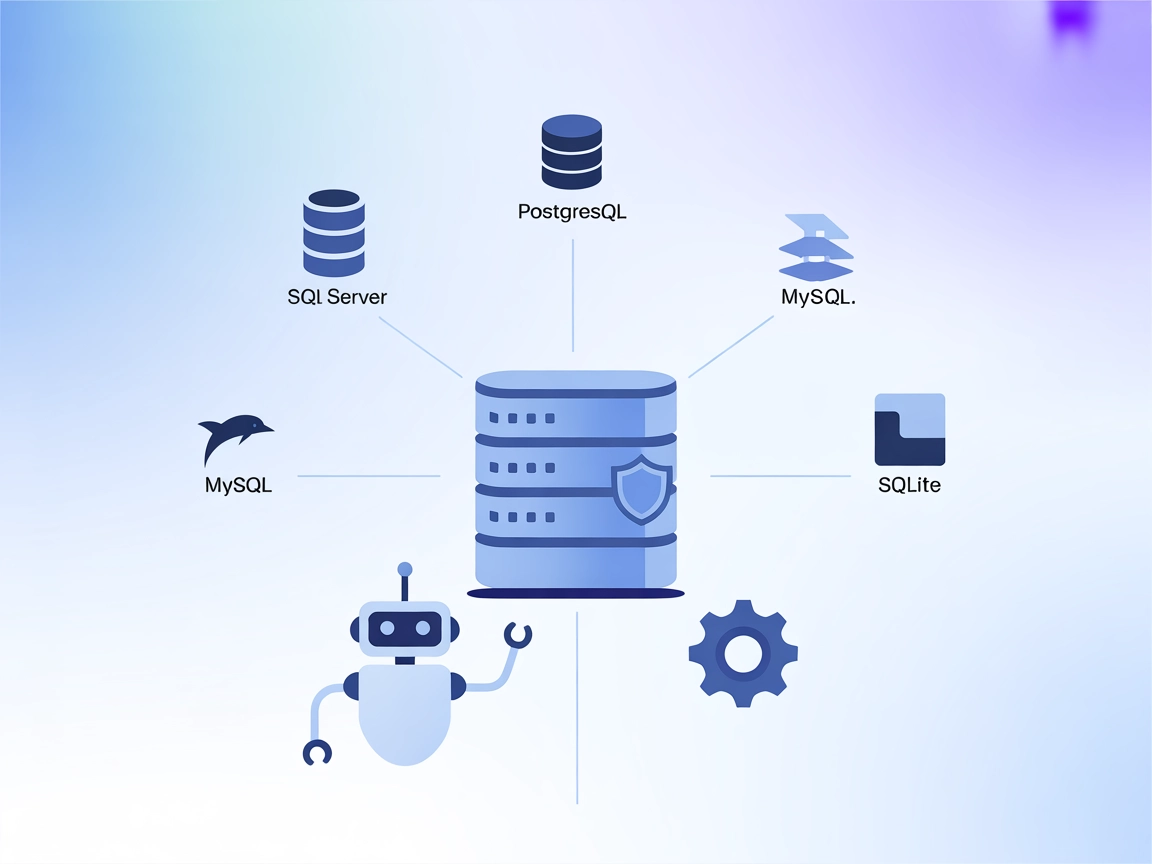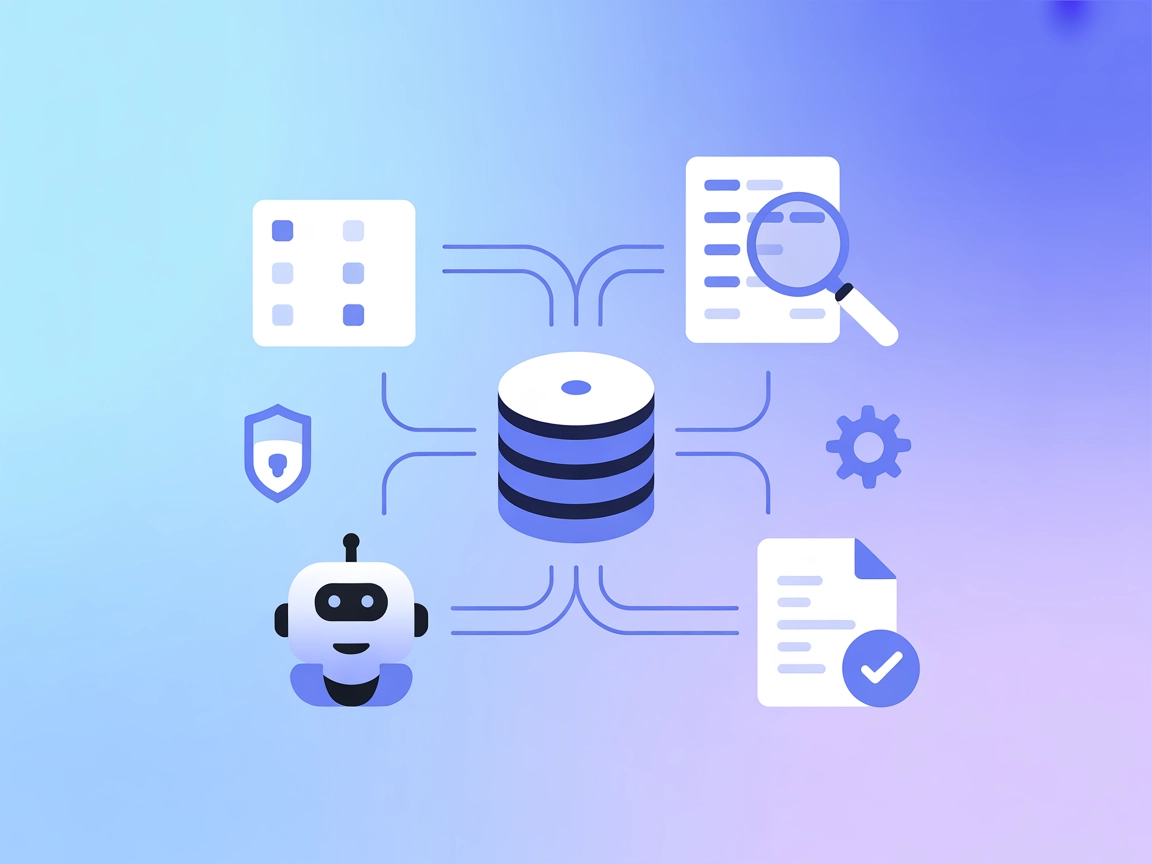
MCP Database Server
The MCP Database Server enables secure, programmatic access to popular databases like SQLite, SQL Server, PostgreSQL, and MySQL for AI assistants and automation...

Connect your AI workflows to BigQuery securely with the BigQuery MCP Server for conversational data exploration, schema discovery, and efficient business intelligence.
FlowHunt provides an additional security layer between your internal systems and AI tools, giving you granular control over which tools are accessible from your MCP servers. MCP servers hosted in our infrastructure can be seamlessly integrated with FlowHunt's chatbot as well as popular AI platforms like ChatGPT, Claude, and various AI editors.
The BigQuery MCP Server is a Model Context Protocol (MCP) server that provides secure, read-only access to BigQuery datasets. It acts as a bridge between Large Language Models (LLMs) and your BigQuery data, allowing AI assistants to query and analyze data through a standardized interface. By translating natural language questions into SQL and managing database security, it enables developers and analysts to interact with their data conversationally—without the need for manual SQL. The server supports both tables and materialized views, offers schema exploration, and enforces safe query limits to protect your data. Its primary role is to enhance workflow efficiency by enabling LLMs to access business intelligence data securely and intuitively.
No prompt templates are mentioned in the repository or documentation.
No specific MCP resources are documented in the repository or README.
No explicit tool list or server.py file is present in the available documentation or code structure.
Natural Language Data Exploration
Users can ask questions in plain English (e.g., “What were our top 10 customers last month?”) and receive answers directly from BigQuery, reducing the need for manual SQL queries.
Secure Business Intelligence
Provides read-only access to sensitive datasets, enabling data analysts and business users to safely explore data without risk of modification.
Schema Discovery
Allows AI and users to explore dataset schemas, distinguishing between tables and views, streamlining the process of understanding available data structures.
Data Analysis within Safe Limits
Enforces query limits (e.g., 1GB by default), ensuring that resource usage is controlled and preventing accidental high-cost queries.
No setup instructions for Windsurf are provided in the repository.
Prerequisites:
Authenticate with Google Cloud:
gcloud auth application-default login
--key-file parameter when starting the server.Add to Claude Desktop config:
Edit your claude_desktop_config.json file:
{
"mcpServers": {
"bigquery": {
"command": "npx",
"args": [
"-y",
"@ergut/mcp-bigquery-server",
"--project-id",
"your-project-id",
"--location",
"us-central1"
]
}
}
}
Save and restart Claude Desktop.
Verify:
Start a chat with Claude and ask a question about your data.
With service account:
{
"mcpServers": {
"bigquery": {
"command": "npx",
"args": [
"-y",
"@ergut/mcp-bigquery-server",
"--project-id",
"your-project-id",
"--location",
"us-central1",
"--key-file",
"/path/to/your/service-account-key.json"
]
}
}
}
Securing API Keys:
Store your service account key outside your repository and reference it via the --key-file parameter. Never commit keys to version control.
Using MCP in FlowHunt
To integrate MCP servers into your FlowHunt workflow, start by adding the MCP component to your flow and connecting it to your AI agent:

Click on the MCP component to open the configuration panel. In the system MCP configuration section, insert your MCP server details using this JSON format:
{
"bigquery": {
"transport": "streamable_http",
"url": "https://yourmcpserver.example/pathtothemcp/url"
}
}
Once configured, the AI agent is now able to use this MCP as a tool with access to all its functions and capabilities. Remember to change “bigquery” to whatever the actual name of your MCP server is and replace the URL with your own MCP server URL.
| Section | Availability | Details/Notes |
|---|---|---|
| Overview | ✅ | |
| List of Prompts | ⛔ | No prompt templates found |
| List of Resources | ⛔ | No resources documented |
| List of Tools | ⛔ | No tools listed in the documentation or code |
| Securing API Keys | ✅ | Service account key via --key-file parameter |
| Sampling Support (less important in evaluation) | ⛔ | Not mentioned |
The BigQuery MCP Server provides a focused, secure, and user-friendly solution for connecting LLMs to BigQuery datasets. However, the repository currently lacks documentation for prompt templates, explicit MCP resources, and tool definitions, which would enhance extensibility and interoperability. The setup is straightforward for Claude Desktop, but instructions for other platforms (like Windsurf, Cursor, or Cline) or for advanced MCP features (roots or sampling) are missing. Overall, this MCP server is solid for its primary use case but limited in extensibility.
Rating: 6/10 — Great for its core job, but missing broader protocol features and documentation.
| Has a LICENSE | ✅ (MIT) |
|---|---|
| Has at least one tool | ⛔ |
| Number of Forks | 25 |
| Number of Stars | 90 |
The BigQuery MCP Server is a bridge between Large Language Models and your BigQuery data. It enables secure, read-only SQL access so AI assistants can answer questions, analyze data, and explore schemas without manual SQL writing.
It is ideal for natural language data exploration, secure business intelligence, schema discovery, and data analysis within safe resource limits.
The server enforces read-only access and strict query limits (e.g., a 1GB default cap) to prevent data modification or high-cost accidental queries. Service account keys are referenced securely via command-line parameters.
No explicit tools or prompt templates are provided in the current version, but it supports schema exploration and conversational querying of tables and materialized views.
Add the MCP component to your FlowHunt workflow, then configure the BigQuery MCP Server endpoint in the MCP configuration section using the provided JSON format. Once set up, your AI agents can access BigQuery via the standardized MCP interface.
Empower your AI agents to query BigQuery data securely and conversationally. Integrate the BigQuery MCP Server into your FlowHunt flows for seamless business intelligence.

The MCP Database Server enables secure, programmatic access to popular databases like SQLite, SQL Server, PostgreSQL, and MySQL for AI assistants and automation...

The ModelContextProtocol (MCP) Server acts as a bridge between AI agents and external data sources, APIs, and services, enabling FlowHunt users to build context...

The MySQL MCP Server provides a secure bridge between AI assistants and MySQL databases. It enables structured database exploration, querying, and data analysis...
Cookie Consent
We use cookies to enhance your browsing experience and analyze our traffic. See our privacy policy.